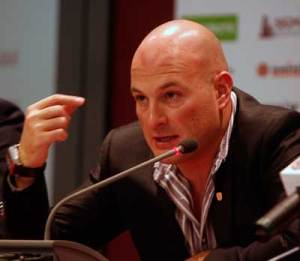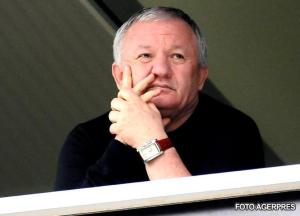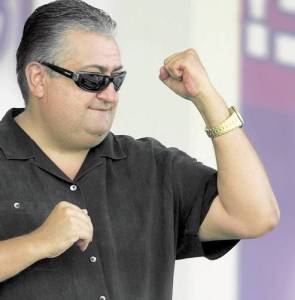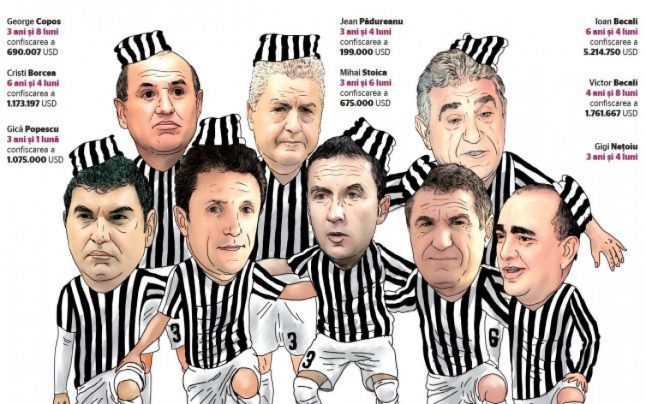We’ve already discussed Romania a few times, but corruption in the country is so rife that it never fails to produce interesting and innovative stories of treachery to report on. The financial naughtiness is of course not confined to the world of Romanian football.
Presidential candidate and current prime minister Victor Ponta is under scrutiny for deals done with big business in the reign of the Social Democrat Adrian Nastase, incidentally the first former Eastern European head of state to see jail time.
Skullduggery in Romanian football will persevere regardless of the country’s rule, so entrenched is it in the fabric of the league’s makeup and history.
Here are some of the fine gentlemen that are currently serving jail spells after being pinched by the national anti-corruption directorate (DNA):
- George Copos – Rapid’s Chairman
- Mihai Stoica – Former General Manager of Otelul Galati, Unirea Urziceni and Steaua
- Gică Popescu – Barcelona’s former captain and player agent
- Ioan Becali and Victor Becali, Player Agents
- Jean Pădureanu – Gloria Bistrita’s Chairman
- Cristi Borcea, Gigi Neţoiu – Former Shareholders of Dinamo Bucharest
Soon to join them?
CFR Cluj – Arpad Paszkany
 Arpad Paszkany took over CFR Cluj in 2001, when the club was in the third division. During this period, CFR won the Premiership title three times (2007/2008, 2009/2010, 2011/2012), the Romanian Cup three times in a row (2008-2010) and the Romanian Super Cup twice in 2009 and 2010.
Arpad Paszkany took over CFR Cluj in 2001, when the club was in the third division. During this period, CFR won the Premiership title three times (2007/2008, 2009/2010, 2011/2012), the Romanian Cup three times in a row (2008-2010) and the Romanian Super Cup twice in 2009 and 2010.
You might also remember them from some high-profile Champions League games, such as their wins over Manchester United and Roma or a spirited draw with Chelsea.
“According to the accounting reports, I poured 107 million euros in the club. Revenues are at least as large. So I can say that in 11 years the club has been running €220-230 million. For nearly two years, the club is self-funded and the club’s annual budget is €15 million. I do not withdraw any money from the revenue coming into the club,” Paszkany said in 2013.
A few months later he withdrew €20 million from the club’s balance. That money came from Champions League revenue and player sales.
There were also many rumours that they fixed matches and bribed referees. Yssouf Kone, Mikael Dorsin and Lars Hirschfeld have spoken about hearing discussions about match-fixing and bribed refs in the locker room (after they had left the club).
The frequent smoking gun with regards to corruption in Romania is the number of malleable foreign players brought in to help skew results. In this case, the club signed more than 80 foreign players since 2004. They played several matches with no more than one or two Romanians in the first 11.
It is believed Paszkany has stepped down attempting to avoid future investigations. On leaving, he said “I divested my shares for the next 10 years to a few groups of companies. I am no longer involved with the club.”
Having recently sold its training ground to try and cover some of the many debts to tax authorities, players and Paszkany himself, many player contracts are expiring, and Cluj’s future is looking very sad indeed.
FC Vaslui – Adrian Porumboiu
 Formed in 2002 by ex-FIFA Referee Adrian Porumboiu, FC Vaslui rapidly became a successful club. They promoted to Premiership in 2005. They gained a European spot in each of the past five seasons, narrowly missing the championship title in 2012, and losing its first Romanian Cup final in 2010.
Formed in 2002 by ex-FIFA Referee Adrian Porumboiu, FC Vaslui rapidly became a successful club. They promoted to Premiership in 2005. They gained a European spot in each of the past five seasons, narrowly missing the championship title in 2012, and losing its first Romanian Cup final in 2010.
Former Real Madrid manager, Juan López Caro, had a short and unsuccessful experience at the club. On the other hand, experienced Portuguese manager Augusto Inácio managed to deliver a 12-1-2 performance in the last part of the season. He then left due to an argument with Porumboiu. Sacking the Portuguese has been the biggest mistake of his life, the Vaslui Chairman later said.
The club rapidly started to change its approach after their first season in the Premiership.
Lots of foreign players began to arrive at the club: Ousman N’Doye, Adaílton, Wesley, Gladstone, Lucian Sânmărtean and Carlo Costly were probably the biggest names who played for the club.
Despite claiming he has spent over €28 million at the club, he sold it last year to his godson for about €23,000 saying he “wishes his name not be associated with the club anymore.“
Many claimed that most referees fear Porumboiu due to his influence in Romanian football. Ironically he has probably been accused as many times of bribing refs as often he has accused others of bribing refs.
However, in September 2011, a few days before the Oţelul – CFR Cluj game, Adrian Porumboiu said on TV:
“It will be a game of friendship, bet on Away Win with high stakes. If it doesen’t end as I said you won’t hear me speaking about a football for a year!”
Porumboiu believed that the game would be fixed because Oţelul had a debt to pay, returning the favour of CFR Cluj from the previous season.
The match ended 0-4, with the first goal being scored in the 1st minute with the help of Oţelul’s experienced captain.
Then, Oţelul only managed to get one red card, despite trying hard to get a second while stopping the 2nd goal.
The third goal was very similar to the first, cutting inside from wide, this time shooting simply between the keeper’s legs at the near post.
Finally, the last goal was again showing full commitment from the home side, with the keeper doing everything in order to let the ball go into the back of the net.
Oţelul had won the title in the 2010/2011 season, whilst CFR Cluj resulted as winner of the next one, beating Oţelul in their both meetings. Vaslui finished 3rd and 2nd on those occasions.
Poli Timişora – Marian Iancu
 Marian Iancu bought the club in 2005. He invested over €40 million during his ownership. Ever since the club began growing. During Iancu’s reign, no less than 101 senior players were signed, with more than 50% of them being foreigners.
Marian Iancu bought the club in 2005. He invested over €40 million during his ownership. Ever since the club began growing. During Iancu’s reign, no less than 101 senior players were signed, with more than 50% of them being foreigners.
After defeating Europa League holders Shakhtar, the club managed to reach the group stages of the European competition in 2009.
The club challenged for the title in the 2012–2013 season and lost two Romanian Cup Finals in 2007 and 2009.
They faced Manchester City in the Europa League Play-offs in 2011, and soon after Costel Pantilimon became a Citizen himself.
Many fans believed the club sold a match to Dinamo Bucharest when their in-form side lost 0-3 at home in 2008. The first and last goals conceded were own-goals.
The club has not received the license to participate in the 2011-2012 Premiership season and was relegated.
Iancu left football saying: “I will stop pumping money at the club next summer. I told supporters I’d quit and won’t return. From now on my company isn’t financing the club, and I am not a public figure anymore.”
He was later sentenced to 11 years in prison for facts unrelated to football.
The club was dissolved and was later refounded by supporters from the region.
Conclusion
These are just three cases from Romanian football in the last decade. The history is much richer than what we’ve summarised here, but we only wanted to present a pattern.
Strange or not, it looks like each of them wanted to clear their names from being associated with their former clubs. They all brought many foreign players to the clubs and lost a lot of money on paper.
We’re letting you draw your conclusions and why not discuss the matter interacting with us and other community members?
We are only asking: Why would you invest heavily in a business that you know will never make a legitimate profit?





Do you have more great aritelcs like this one?